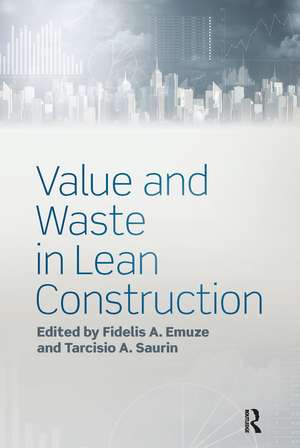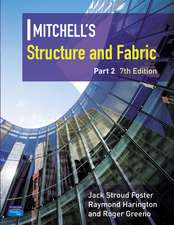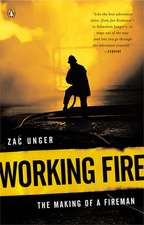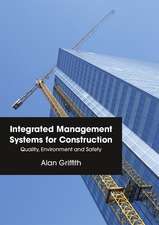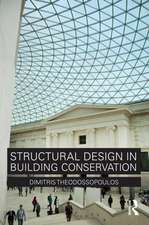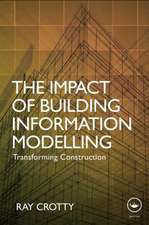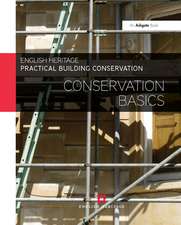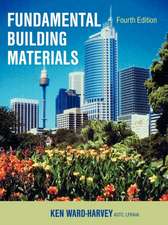Value and Waste in Lean Construction
Editat de Fidelis Emuze, Tarcisio Saurinen Limba Engleză Paperback – 30 iun 2021
This internationally researched collection seeks to create a paradigm shift, which will shape work processes and future directions for how value is conceptualized and operationalized in both the project management and business aspects of construction. The readers will gain an understanding of:
- The value-adding paradigm in construction
- How to make value-supporting decisions
- Waste identification and control in practice
| Toate formatele și edițiile | Preț | Express |
|---|---|---|
| Paperback (1) | 316.89 lei 6-8 săpt. | |
| CRC Press – 30 iun 2021 | 316.89 lei 6-8 săpt. | |
| Hardback (1) | 1107.90 lei 6-8 săpt. | |
| CRC Press – 16 noi 2015 | 1107.90 lei 6-8 săpt. |
Preț: 316.89 lei
Nou
Puncte Express: 475
Preț estimativ în valută:
60.65€ • 63.08$ • 50.07£
60.65€ • 63.08$ • 50.07£
Carte tipărită la comandă
Livrare economică 14-28 aprilie
Preluare comenzi: 021 569.72.76
Specificații
ISBN-13: 9780367355654
ISBN-10: 0367355655
Pagini: 176
Ilustrații: 14 Line drawings, black and white; 14 Halftones, black and white; 16 Tables, black and white
Dimensiuni: 156 x 234 x 10 mm
Greutate: 0.25 kg
Ediția:1
Editura: CRC Press
Colecția Routledge
Locul publicării:Boca Raton, United States
ISBN-10: 0367355655
Pagini: 176
Ilustrații: 14 Line drawings, black and white; 14 Halftones, black and white; 16 Tables, black and white
Dimensiuni: 156 x 234 x 10 mm
Greutate: 0.25 kg
Ediția:1
Editura: CRC Press
Colecția Routledge
Locul publicării:Boca Raton, United States
Public țintă
Postgraduate and ProfessionalCuprins
Introduction Part 1: Theory of Waste in Construction 1. Wastes in Construction: Concepts and Types 2. Making-Do or Resilience? Making Sense of Variability 3. Measuring Workflow and Waste in Project-based Production Part 2: Value in Construction 4. A Systemic Proposal for the Concept of Value in Lean Construction 5. Value is Relative: How Decision Making Theories affect Lean Construction 6. Lean and Sustainability in Construction: Creating Value Part 3: Control of Waste in Construction 7. Last Planner System: Improving Planning Procedures as an Approach to Reduce Waste 8. Guidelines and Conditions for Implementing the Kanban System in Construction 9. Use of Andon in a Horizontal Residential Construction Project 10. Genchi Genbutsu: the importance of ‘Go And See Yourself’ to Project Value Conclusion
Notă biografică
Fidelis A. Emuze is Associate Professor and Head of the Department of Built Environment, and Head of the Unit for Lean Construction and Sustainability at the Central University of Technology, Free State, South Africa. Construction research in lean construction, health and safety, supply chain management, and sustainability constitutes the main research interest of Dr Emuze, who is a member of the Association of Researchers in Construction Management and the Lean Construction Institute.
Tarcisio Abreu Saurin is a Professor in the Industrial Engineering Department of the Federal University of Rio Grande do Sul (UFRGS) in Porto Alegre, Brazil. His main research interests are related to lean production and safety management in complex systems. He has worked as a coordinator and/or researcher in funded projects related to those areas in construction, electricity distribution, manufacturing, and healthcare.
Tarcisio Abreu Saurin is a Professor in the Industrial Engineering Department of the Federal University of Rio Grande do Sul (UFRGS) in Porto Alegre, Brazil. His main research interests are related to lean production and safety management in complex systems. He has worked as a coordinator and/or researcher in funded projects related to those areas in construction, electricity distribution, manufacturing, and healthcare.
Descriere
This book builds a common understanding of the role and contribution of value-adding activities in achieving stipulated objectives and continuous improvement in construction projects, and contrasts this with what lean construction calls "waste".
